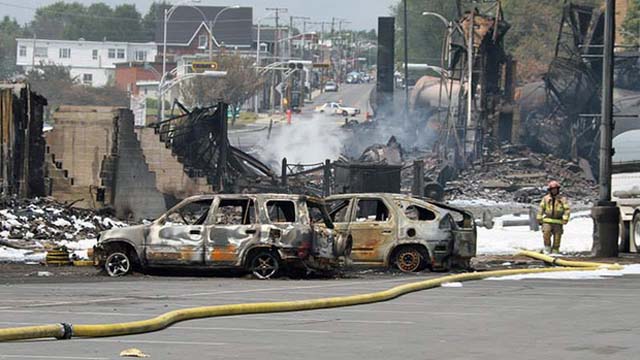

Two burned out cars and buildings at Lake Megantic - Date/Photographer unknown.
8 July 2013 Quebec Firefighters Reportedly Cut Power to Runaway Train's Brakes Lake Megantic Quebec - Air brakes that would have prevented the Quebec train disaster failed because they were powered by an engine that was shut down by firefighters as they dealt with a fire shortly before the calamity occurred, the head of the railway that operated the train said on Monday.
The runaway oil tanker train derailed in Lake Megantic shortly after 1 a.m. Saturday, exploding in a deadly ball of flames and killing at least 13 people, with dozens still missing and feared dead.
Police said they estimated a total of around 50 people were either dead or missing after the gigantic blast destroyed dozens of buildings in the center of Lake Megantic.
The coroner's office asked relatives of the missing to bring in toothbrushes, hair brushes, combs, and razors so specialists could extract DNA samples from strands of hair.
The train had been parked at a siding on a slope near the town of Nantes, which is 8 miles west of Lake Megantic. The volunteer Nantes fire service was called out late Friday night to deal with an engine fire on one of the train's locomotives.
Nantes Fire Chief Patrick Lambert told Reuters the crew had switched off the engine as they extinguished a "good-sized" blaze in the engine, probably caused by a fuel or oil line break in the engine.
The problem was that the engine had been left on by the train's engineer to maintain pressure in the air brakes, Ed Burkhardt, chairman of Montreal Maine & Atlantic Railway (MMA), said in an interview. As the pressure gradually "leaked off," the air brakes failed and the train began to slide downhill, he said.
The fire service said it contacted a local MMA dispatcher in Farnham, Quebec, after the blaze was out.
"We told them what we did and how we did it," Lambert said.
Asked whether there had been any discussion about the brakes, he replied: "There was no discussion of the brakes at that time. We were there for the train fire. As for the inspection of the train after the fact, that was up to them."
It was not immediately clear what the MMA dispatcher did after speaking with the fire service. Burkhardt said the fire service also should have tried to contact the train's operator, who was staying at a nearby hotel.
"If the engine was shut off, someone should have made a report to the local railroad about that," he said.
Inspectors examined the locomotive the day before it derailed and exploded but found no problems with it, Canadian Transport Minister Denis Lebel told reporters on Monday.
Andre Gendron, 38, lives on a wooded property next to the rail yard in Nantes. He said he was burning a campfire outside his trailer on Friday night when he heard the fire trucks.
"About five minutes after the firemen left, I felt the vibration of a train moving down the track. I then saw the train move by without its lights on," Gendron told Reuters.
"I found it strange its lights weren't on and thought it was an electrical problem on board. It wasn't long after that I heard the explosion. I could see the light from the fires in Lake Megantic."
The tragedy is particularly devastating for a town with only 6,000 residents. The blast razed dozens of buildings, including a popular bar called Musi-Cafe, where many of those reported missing are believed to have been.
Bernard Theberge, 44, was on Musi-Cafe's patio when he saw the train approach. He said there may have been 50 people inside the bar.
"There was a big explosion, the heat reached the cafe and then a big wall of fire enveloped the road," said Theberge, who escaped with second-degree burns to his arm. "There were people inside. I thought for maybe 2 seconds that I should go in, but the heat was too strong to get to the door."
"It's hard, it's huge. Imagine half the town on fire," he said.
The downtown core remained cordoned off on Sunday as police, regulators, and the company that owned the train, Montreal Maine & Atlantic Railway, tried to figure out what happened. About 2,000 people were evacuated.
"I was sleeping when it happened. There was a boom and the inside of my house turned red with the color of the flames. I left with nothing but the shirt on my back," said Rene Bolduc, who lives a few hundred meters from the site of the accident. He said he saw people running as flames towered overhead.
"It felt like the hairs on my arms and face were burning off." Bolduc was not hurt, and has not been back to his house, which is in the blocked off area.
Most shops were closed and homes deserted on Sunday. Scores of men, women, and children sat inside the local school, a large brick building transformed into a makeshift shelter. Children played ball in a corner room while adults napped on cots. Trucks delivered water and food.
"At least we are not out on the street," said Valerie Dinelle, 27, who sat on a cot next to her caged cat, Pixel. She said she was evacuated on Saturday afternoon when the wind shifted and blew toxic smoke into her neighborhood.
Outside, sitting in the shade, Louise Boulet, 65, looked at a local newspaper that had published an aerial view of the explosion scene.
"That is where my sister lived," she said pointing to an image of a flattened building. "She is dead for sure. If she were alive, her car would not still be there," she said, pointing to a burnt vehicle next to the building.
Her sister, Marie-France Boulet, 63, ran a women's clothing shop from the front of the building where she lived.
"She was my best friend. She died with all of my secrets, and I will guard all of hers," she said, tears welling up in her eyes.
Canadian crash investigators said they will look at the two sets of brakes on the train, the air brakes and the hand brakes, as they probe what could turn out to be Canada's deadliest rail accident since 1956.
Burkhardt said that after the pressure leaked out of the air brakes, the hand brakes would not have been strong enough to keep the train in place.
Montreal Maine & Atlantic is one of many North American railroads that have vastly stepped up shipments of crude oil as pipelines from North Dakota and from oil-producing regions in western Canada fill to capacity, and the accident is bound to raise concern about the practice of transporting oil by rail.
Richard Valdmanis and P.J. Huffstutter.



Vancouver Island
British Columbia
Canada
|

